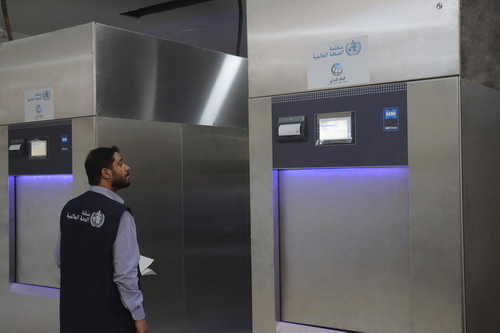 With the support of the World Bank, the Emergency Health and Nutrition Project has updated sterilization equipment at Al-Thawra hospital.
With the support of the World Bank, the Emergency Health and Nutrition Project has updated sterilization equipment at Al-Thawra hospital.
29 December 2019 – Based on data gathered by WHO from a number of countries, it can be estimated that each year, hundreds of millions of patients around the world are affected by health care-associated infections (HAI). The burden of HAI is several fold higher in low- and middle-income countries than in high-income ones.
In a country torn apart by war, Yemeni people seeking medical support struggle to receive proper and effective medical treatment. Most of the hospital’s medical equipment requires replacement like the sterile supply department of Al-Thawra hospital. The equipment was so old that it would be the cause of delay or cancellation of critical surgeries since the sterilization process of instruments would take hours instead of minutes.
But thanks to the support of the World Bank through the International Development Association under the framework of the Emergency Health and Nutrition Project, Al-Thawra hospital now has the updated sterilization equipment it has desperately needed. This is crucial since the proper sterilization process is a necessary component in ensuring that infection prevention and control in hospitals remains a priority.
“The number of patients in Al-Thawra hospital benefiting from the support is three to four thousand beneficiaries on a monthly basis and approximately from 120 to 130 operations a day in 26 medical departments, some of these operations need to go through sterilization process in 16 minutes, but the central sterile equipment, very old, resulted in delaying or cancelling the operations, so the modern sterile supply can sterilize in 16 minutes to save lives through performing urgent surgeries without procrastinating” said the Manager of the CSSD of Al-Thawrah Hospital, Mansor Kuhazah.
“Now the central sterile department of Al-Thawra is in a position to sterilize plastic and instrumens rapidly due to the modern sterile equipment being provided by WHO through the Emergency Health and Nutrition project”, said the Engineer Mohammed Nofal, who rehabilitated the sterilization department of the hospital.
Under the Emergency Health and Nutrition Project, WHO and UNICEF with its technical partner the World Bank through the International Development Association continue to meet health needs, as well as expectations, in Yemen.
The EHNP is a crosscutting project providing essential health and nutrition services across the country. In the midst of the ongoing war, the EHNP is protecting and preserving the health system. EHNP supports 72 hospitals across the Republic of Yemen with a suite of essential life-saving health services. WHO, the World Bank and UNICEF work closely to strengthen the referral system the primary and secondary levels to the tertiary levels of care. In addition, EHNP supports public health programmes, disease response and outbreaks such as cholera and diphtheria.


